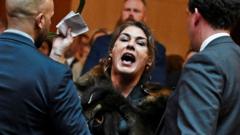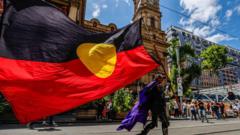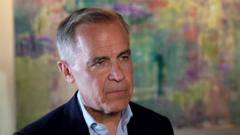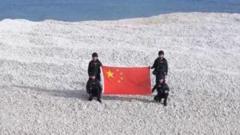Australian lawmakers have officially censured Senator Lidia Thorpe, following her vocal protest against King Charles during his visit to Canberra last month, which has ignited discussions about colonial histories and Indigenous rights.
Australian Senator Censured Following Heckling of King Charles

Australian Senator Censured Following Heckling of King Charles
Senator Lidia Thorpe's protest during King Charles' address in Parliament sparks significant backlash and political debate.
In the Great Hall of Parliament, Senator Thorpe interrupted the King by shouting, "you are not my King" and "this is not your land," expressions of dissent against the legacy of British colonization. The Senate's censure motion, which passed with a vote of 46 to 12, condemned her actions as "disrespectful and disruptive." This political gesture, while symbolic, does not carry any legal ramifications or remove her from her position.
Thorpe, who has long championed Indigenous issues, claimed she was not allowed to respond within the chamber due to a flight delay. After the vote, she stated, "The British Crown committed heinous crimes against the first peoples of this country... I will not be silent." Her bold actions received mixed reactions; while some lawmakers and Aboriginal leaders criticized her conduct, others supported her stance for raising awareness about the injustices faced by Indigenous Australians.
The debate surrounding the protests highlights a broader conversation about the lack of a treaty between Australia's government and its Indigenous peoples, in stark contrast to other former British colonies. Thorpe, herself a member of the Gunnai, Gunditjmara, and Djab Wurrung nations, has been a prominent voice advocating for such a treaty, emphasizing that sovereignty was never ceded by Aboriginal peoples.
Despite the controversy, King Charles was greeted with enthusiasm by the majority of Australians during his five-day tour, with Prime Minister Anthony Albanese acknowledging the historical significance of constitutional discussions surrounding the monarchy's role in Australia. Thorpe's activism is not new; she previously stirred controversy during her swearing-in ceremony by labeling Queen Elizabeth II a colonizer and contested a recent referendum meant to provide constitutional acknowledgment to Aboriginal and Torres Strait Islander peoples.
This censure and the responses to Thorpe's protest reveal deep divisions in Australian society regarding historical recognition, the monarchy, and Indigenous rights, indicating that the discussion is far from over.
Thorpe, who has long championed Indigenous issues, claimed she was not allowed to respond within the chamber due to a flight delay. After the vote, she stated, "The British Crown committed heinous crimes against the first peoples of this country... I will not be silent." Her bold actions received mixed reactions; while some lawmakers and Aboriginal leaders criticized her conduct, others supported her stance for raising awareness about the injustices faced by Indigenous Australians.
The debate surrounding the protests highlights a broader conversation about the lack of a treaty between Australia's government and its Indigenous peoples, in stark contrast to other former British colonies. Thorpe, herself a member of the Gunnai, Gunditjmara, and Djab Wurrung nations, has been a prominent voice advocating for such a treaty, emphasizing that sovereignty was never ceded by Aboriginal peoples.
Despite the controversy, King Charles was greeted with enthusiasm by the majority of Australians during his five-day tour, with Prime Minister Anthony Albanese acknowledging the historical significance of constitutional discussions surrounding the monarchy's role in Australia. Thorpe's activism is not new; she previously stirred controversy during her swearing-in ceremony by labeling Queen Elizabeth II a colonizer and contested a recent referendum meant to provide constitutional acknowledgment to Aboriginal and Torres Strait Islander peoples.
This censure and the responses to Thorpe's protest reveal deep divisions in Australian society regarding historical recognition, the monarchy, and Indigenous rights, indicating that the discussion is far from over.



















